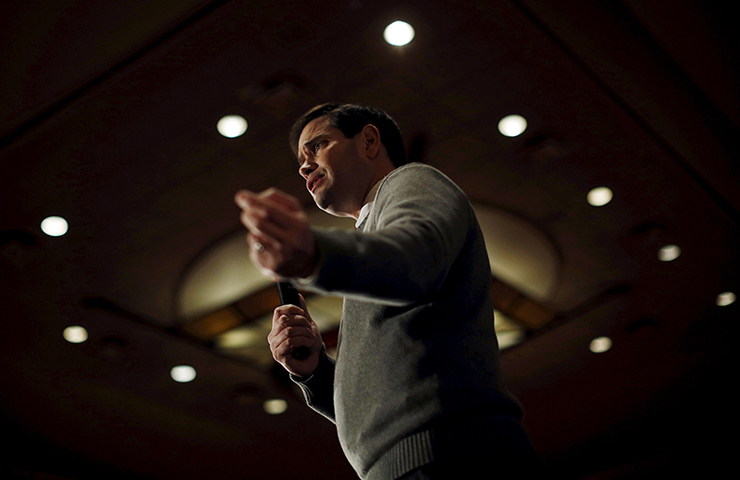
U.S. Republican presidential candidate Marco Rubio speaks at a campaign event in Coralville, Iowa, on January 18, 2016. (Reuters/Jim Young)
Confronted by an “activist atheist,” Marco Rubio said he’ll champion a country where “no one is forced to violate their conscience."
“No one is going to force you to believe in God, but no one is going to force me to stop talking about God,” said the Florida senator, prompting applause and a whistle of support from the crowd at a campaign appearance.
During a town hall on Monday morning, Justin Scott, 34, of Waterloo asked about Rubio’s new ad, explaining that atheists such as him are “looking for somebody that will uphold their rights as Americans, and not pander to a certain religious group,” he said.
In the commercial, Rubio does not mention specific political policy but discusses how “our goal is eternity, the ability to live alongside our creator for all time. To accept the free gift of salvation offered by Jesus Christ.”
“You have a right to believe whatever you want,” said Rubio, a Roman Catholic, in response. “You have a right to believe in nothing at all.”
Rubio went on to explain how his faith has been the “single greatest influence in my life, and from that I’ll never hide.”
The ad may signal a greater appeal by Rubio to social conservatives, in addition to the business-minded voters who are backing him, said Chris Larimer, a political science professor at the University of Northern Iowa.
Rubio and his supporters have said he will unite the Republican party.
But in Iowa, the two branches of the Republican Party have been drawn to different candidates, In 2012, for example, many Evangelical voters supported Rick Santorum while establishment voters backed Mitt Romney.
“I think what he’s trying to do is put a foot in both pants,” Larimer said.
Social conservatives have become an increasingly important voting bloc here and could total 40% of likely caucusgoers this year, he said. “He’s emphasizing faith this late in the campaign; that would suggest to me that his campaign sees an opening there,” Larimer said.
Rubio is third place in Iowa, with nearly 12 percent, according to a rolling average of polls. And on either side are two rivals who have appealed greatly to Evangelical voters: Ted Cruz, with nearly 27 percent, and Ben Carson, with nearly 9 percent.
But others question whether a faith-based ad will have the same effect as discussing his religious views in person. Cruz, for example, has campaigned at churches and discussed his Christian beliefs more frequently in Iowa as part of his 99-county tour.
And David Andersen, a political science professor at Iowa State University, said that Rubio’s use of a commercial to share his faith runs the risk of seeming “impersonal.”
But after Rubio shared his beliefs Monday morning, Deb Berstler said she impressed with his candor and sincerity.
She expects candidates such as Mike Huckabee, a pastor, to discuss their faith on the campaign trail -- and said it was refreshing to hear it from Rubio.
“I think it’s the first time I ever heard a candidate present his faith as deeply and extensively as he did,” said the 64-year-old, noting Rubio answered the atheist’s question respectfully. “That’s going to set him apart.”